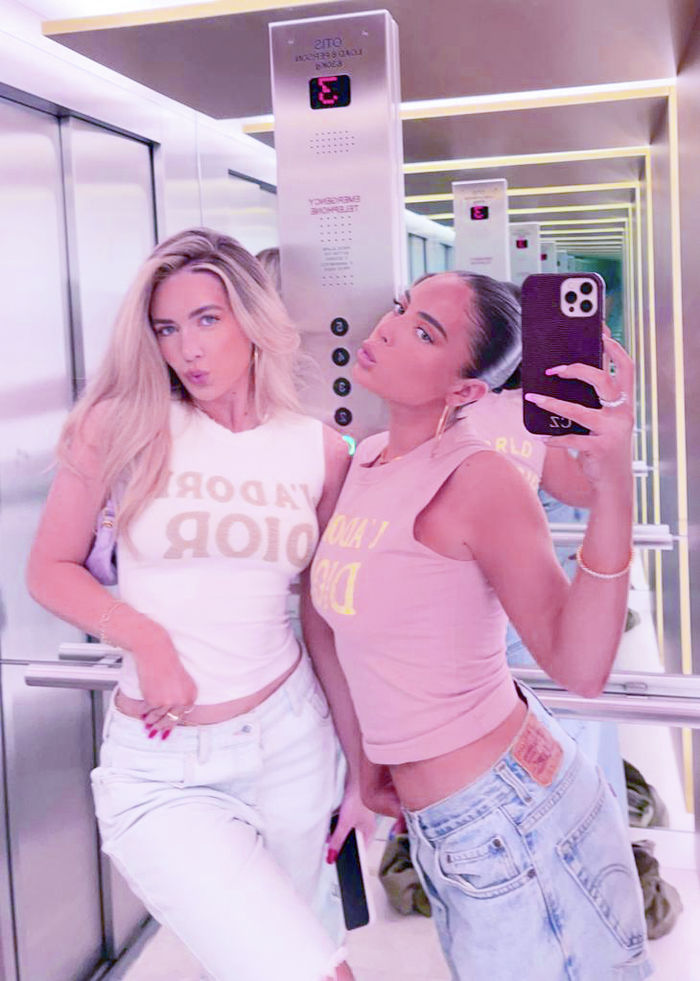Not so pretty? Fast Fashion, feminism and Molly-Mae
Fashion Columnist Eleanor Antoniou highlights the performative and selective feminism of fast fashion brands
She spends hours hunched over a sewing machine, aching fingers, sitting in a cramped factory, afraid of abuse and harassment from her male bosses. Her working conditions are all too often dangerous and unsanitary. She is just one among thousands of women who make up the backbone of the fast fashion industry. 80% of garment workers are women and, without these women, it would be impossible for contemporary, popular brands like Pretty Little Thing to constantly upload desirable new items to their websites. Fast fashion companies can produce and sell clothing at a stellar rate because of garment workers, whose dire exploitation is hidden behind shiny websites, beautiful models and cheap products.
“fast fashion companies can evidently afford to favour certain women”
Heartbreakingly, the women who make our clothes are often denied living wages or job security. Their personhood is undervalued by rich companies, who choose to ignore the problem, rather than take responsibility for their substandard ethics. In 2020, it was uncovered that this issue exists even in the UK, when Pretty Little Things’s Leicester factory was found to be paying their workers just £3.50 an hour, a rate equivalent to slave labour.
However, while fast fashion companies seemingly ignore the awful treatment of their female garment workers, they can evidently afford to favour certain women. Recently, Love Island star and influencer, Molly-Mae Hague, announced that she accepted a lucrative new job as Creative Director for Pretty Little Thing, in a deal worth £1 million. While I’m happy to see a woman earning a top job in the fashion industry, in which most major brands are run by men, Molly-Mae’s appointment also uncovers the fake feminism of fast fashion brands.
Pretty Little Thing claims to empower women, often posting about female empowerment on their blog and social media, and yet this clearly does not apply to all women. Why should one woman be deemed to matter so excessively more than others who work for the same company? Molly-Mae is earning a seven-figure salary, while the women making the clothes she promotes and wears are not even paid a living wage.
In an interview with BBC Newsbeat, Molly-Mae was asked about these issues. However, she chose not to respond. It seems she is taking the stance of feigned ignorance about the ethical issues behind Pretty Little Thing, which many of her followers will not question or even be aware of. As a blonde, white woman with millions of fans, Molly-Mae will easily be allowed to uphold her innocent image. However, Molly-Mae is not an ignorant or unintelligent influencer, and to argue that she is only upholds a narrow stereotype against her. As someone who works in fashion, and who makes money from promoting clothing on her social media, Molly-Mae surely understands better than anyone how the fast fashion industry functions.
“why do garment workers’ human rights matter less, and why can’t they be included in ‘female empowerment’ as well?”
I love how authentic Molly-Mae has been in the past about the removal of her fillers and her struggles with endometriosis. In these moments, she truly has been an inspiration for women, giving a voice to issues which are usually ignored by the mainstream media. In her open conversations about female pain and body confidence, Molly-Mae has shown how empowering she can be for many women. Nevertheless, female garment workers are left out of this empowerment. In accepting the job at Pretty Little Thing, the brand’s garment workers are now part of Molly-Mae’s responsibility. They are the ones who will be executing her creative decisions, but still she has turned a blind eye, ignoring the issue in every mention she has made of her new job so far, and allegedly deleting any comments on her Instagram which call for awareness of Pretty Little Thing’s ugly side.
Of course, the problems of fast fashion do not rest on Molly-Mae’s shoulders alone, and it would be unfair for her to carry the entire blame surrounding the industry’s pretty little lies. However, as fair fashion advocate, Venetia La Manna, has written on Twitter, “The day when a celebrity publicly declines a fast fashion partnership and uses their platform to raise awareness about the disastrous impact fashion is having on both people and planet cannot come soon enough.”
Pretty Little Thing and Molly-Mae claim that they want to empower women through clothing, but this is hypocritical and performative because their ‘feminism’ stops with the women behind the scenes. Why do garment workers’ human rights matter less, and why can’t they be included in ‘female empowerment’ as well? If Molly-Mae were to stand up for the garment workers at Pretty Little Thing and stop glamourising fast fashion, the difference she could make would be breathtaking. We all love our clothes, so surely we should be remembering the people who made them, and celebrate these workers by giving them the rights, value and voice that they are owed.
 News / Uni Scout and Guide Club affirms trans inclusion 12 December 2025
News / Uni Scout and Guide Club affirms trans inclusion 12 December 2025 News / Pembroke to convert listed office building into accom9 December 2025
News / Pembroke to convert listed office building into accom9 December 2025 News / Cambridge Vet School gets lifeline year to stay accredited28 November 2025
News / Cambridge Vet School gets lifeline year to stay accredited28 November 2025 Features / Searching for community in queer Cambridge10 December 2025
Features / Searching for community in queer Cambridge10 December 2025 News / Uni redundancy consultation ‘falls short of legal duties’, unions say6 December 2025
News / Uni redundancy consultation ‘falls short of legal duties’, unions say6 December 2025










